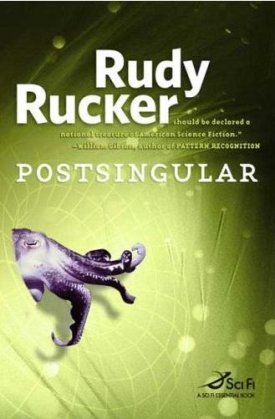IO9's Annalee Newitz takes aim at the idea of the Singularity in an essay called "Why the Singularity isn't going to happen." Newitz's objection to the idea that technology will allow us to transcend human limitation and misery boils down to this: the vision of technological utopia is insufficiently weird. It is a "[vision] of tomorrow [based on] on fantasies from the past rather than what we can glean from factual accounts of history." It assumes that technology will solve problems but doesn't consider what new problems will emerge.
I think that this may be true of people who embrace the Singularity as a scientific prediction or even as a social project, but I don't think it's particularly true of literature about the Singularity. Novels like Vernor Vinge's Rainbows End, Rudy Rucker's Postsingular and Karl Schroeder's Sun of Suns, are all about this idea of problems lurking inside the solutions. Charlie Stross and I have written two novellas, "Jury Service" and "Appeals Court," that are also about this notion (we're writing a third one now, "Parole Board," and Tor's going to publish all three as a novel called Rapture of the Nerds).
Indeed, it seems to me that in literature, the Singularity's role is to serve as a straw-man for critiquing technology as a one-sided panacea (see, for example, my interview with Ray Kurzweil on the Singularity as a literary device, a spiritual belief system, and a technological prediction).
But Newitz's critique of insufficiently weird technological prediction is spot on. She's identified a common flaw in futuristic prediction: assuming that technology will go far enough to benefit us, and then stop before it disrupts us. For a prime example from recent history, see the record industry's correct belief that technology would advance to the point where we could have optical disc readers in every room, encouraging us to buy all our music again on CD; but their failure to understand that technology would continue to advance to the point where we could rip all those CDs and share the music on them using the Internet.
What people of the industrial age didn't bargain on – didn't even know about – were all the ways that byproducts of industry would destroy the environment. And I don't just mean in a save-the-Earth kind of way: I mean that when Friedrich Engels walked through industrial Manchester in the mid-nineteenth century he was completely blindsided by how destroyed people's lives were by pollution and life in cities built around factories. In response, he wrote The Condition of the Working Class in England, a document that would have stunned reformers fifty years earlier, many of whom believed that industrialization would solve every social problem and remove the burden of physical labor from the shoulders of even the poorest people.
There's no denying that industrialization laid the foundations for a better, more productive society. It has led to countless innovations, and has improved the lives of many working people. But it also destroys life in ways that Adam Smith and Eli Whitney could never have imagined. It has transformed our entire planet, from its ecosystems to its atmosphere and beyond. It's only a slight exaggeration to say that we do not live on the same planet that people lived on in 1750. The environment – from megacities to airborne particles and space junk – has changed that much.
Singularity-level technology changes the world to the point where the things our ancestors wanted are not the same things we want. Today, we are trying to roll back the effects of industrialization. We are trying to undo the damage that penicillin did. If history, real history, teaches us any lesson it's that new technologies do not cause us to transcend. They fix some things, and then cause new problems we hadn't anticipated.



